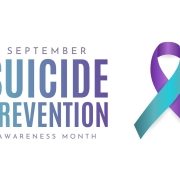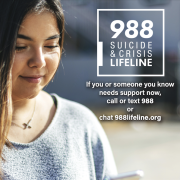Suicide Prevention: Supporting a Loved One
By Jennifer Mullen, LPC | Counselor
Who is at Risk?
Suicidal thoughts can impact anyone regardless of age, gender, or cultural background. According to the National Alliance on Mental Illness (NAMI), 4.9% of all adults have experienced serious thought of suicide. That number increases to 11.3% in young adults ages 18-25, 18.8% in high school students, and 45% in LGBTQ+ youth. Suicide is the 12th leading cause of death overall in the United States, second leading cause of death among people 10-14, and the third leading cause of death among people 15-24. We can impact these numbers by spreading the word about suicide awareness and prevention.
What to Look For and When to Act?
Everyone has a bad day from time to time, but when that bad day turns into multiple days, or difficulty with routine daily tasks, it’s important to take notice. Some might notice increased isolation from friends or family or decreased interest in social, work, or academic activities. Others may notice a change in anxiety, depression, substance use, performance at work or school, prolonged stress, or difficulty adjusting to situations. Regardless of the change, there is hope and ways to take action and offer support.
What to Do?
It can be extremely difficult and scary when a loved one, child, friend, or family member is experiencing mental health symptoms, especially suicidal thoughts. Have frequent conversations with your children and family about mental health and complete “emotion check-ins”. If you make this a part of your daily routine, you begin to normalize mental health and make it comfortable to have conversations when your loved ones when they are struggling, especially with suicidal thoughts.
Another way to offer support is to listen and validate their experience. You might not understand what they are going through, but you are able to offer support and create a safe place for active listening. Get feedback and support from others: siblings, family members, friends, community members, teachers. Noticing how behaviors change in multiple settings can help assess the severity of the problem and determine what the next steps should be.
The best way to prevent a suicide-related crisis is to seek help and support before the crisis occurs. If someone you love feels worried, but does not feel they are in imminent danger, encourage them to talk to their medical provider or mental health professional. Learn more about NOAH’s counseling or psychiatric services. It’s also important to get friends and family involved, we all need support. If you think your child or loved one is in immediate danger, call a crisis line, take them to the nearest hospital, or call 911.
- Maricopa County Crisis Line: 1-800-631-1314 or 602-222-9444
- National Suicide Prevention Lifeline (1-800-273-8255)
- Crisis Text Line (“NAMI” to 741-741)
- Suicide and Crisis Lifeline: 988









